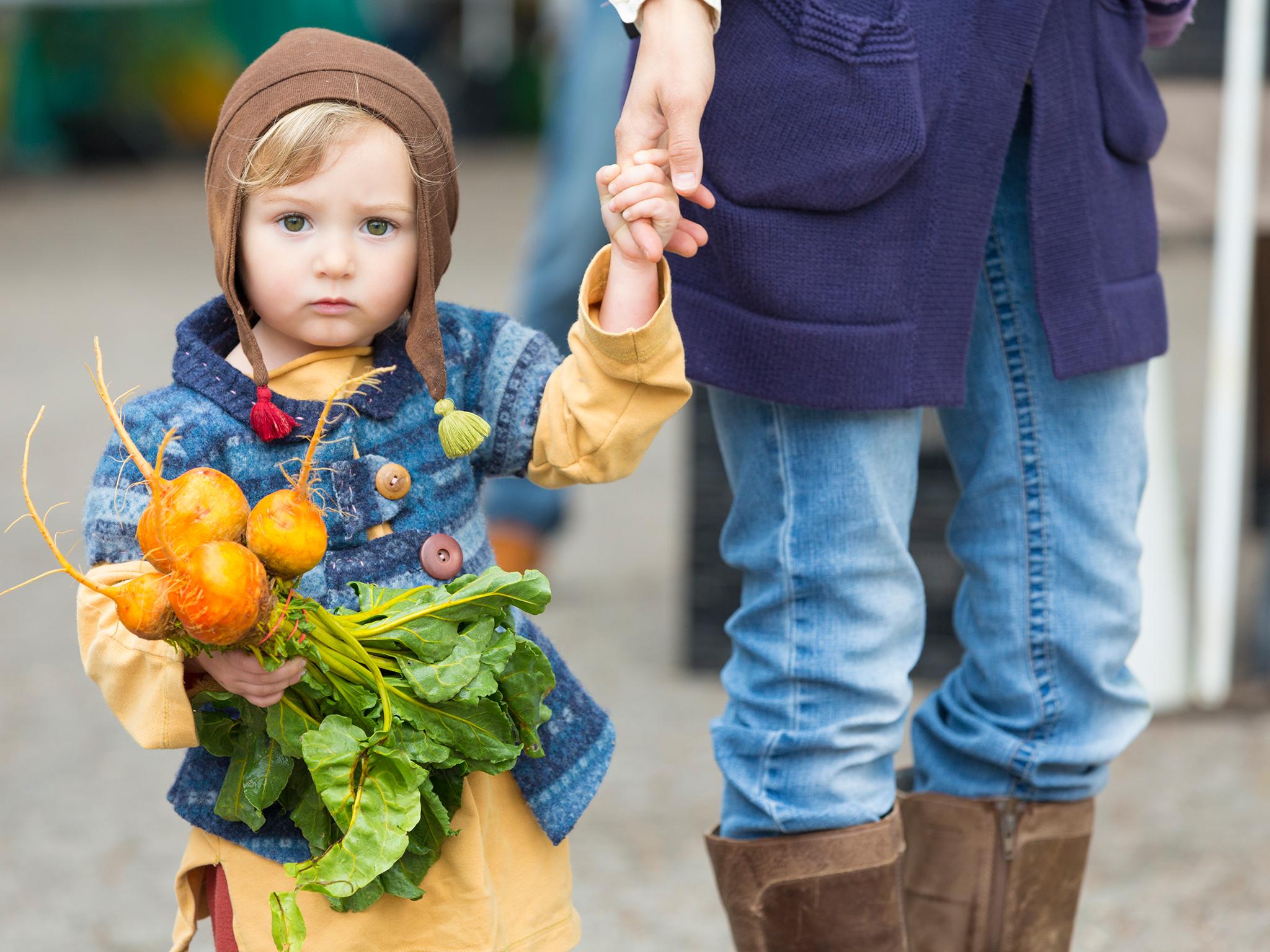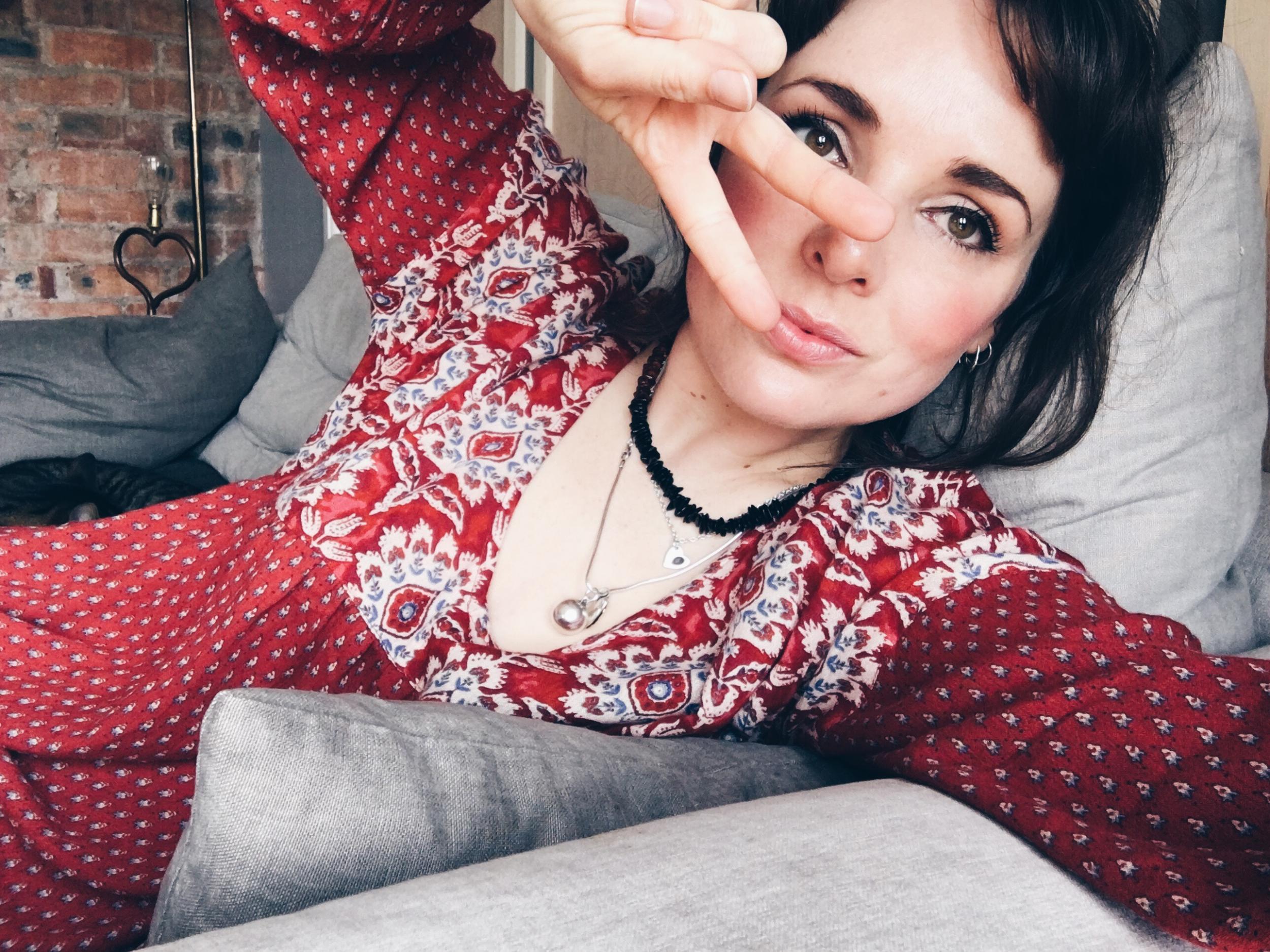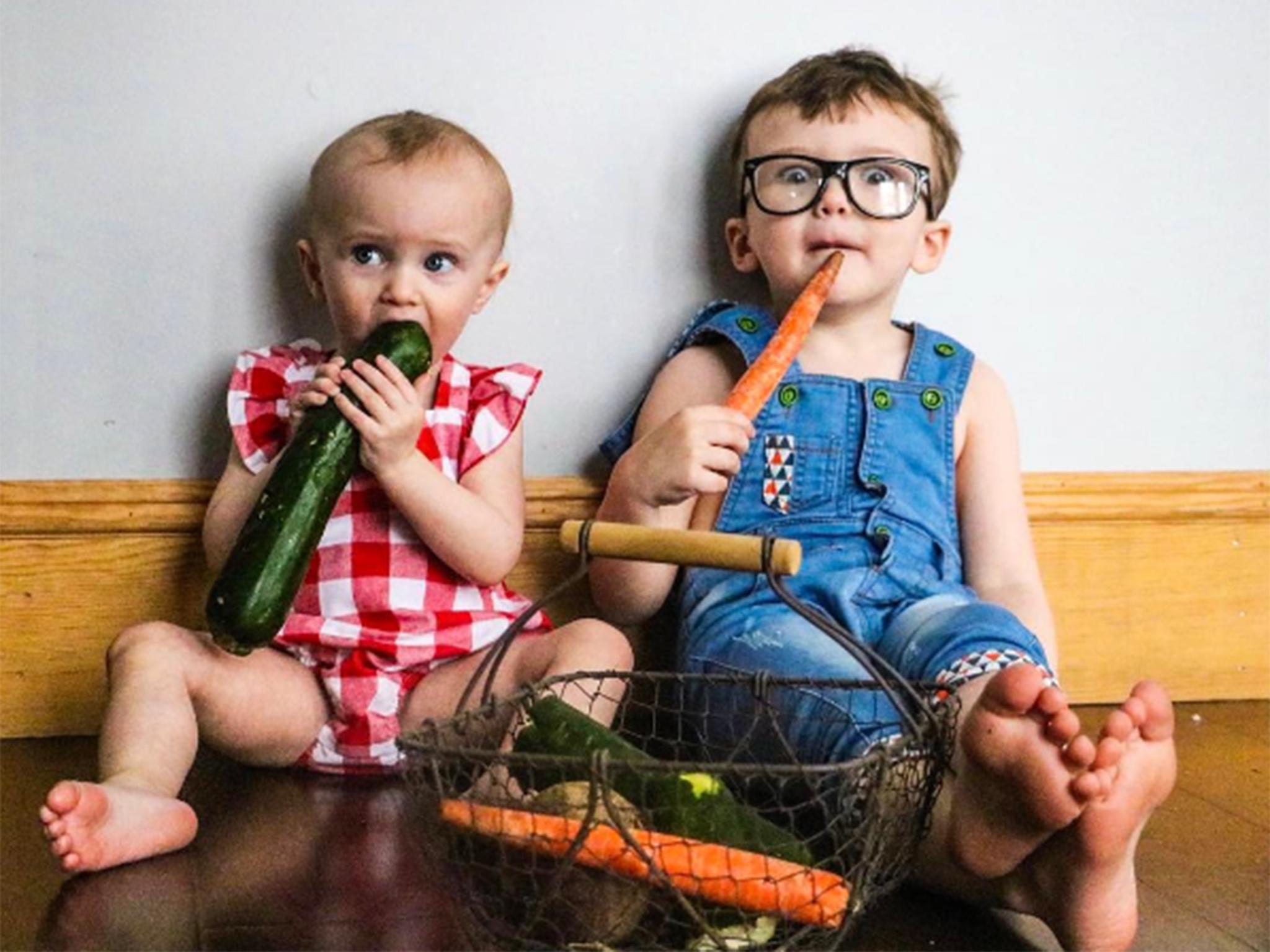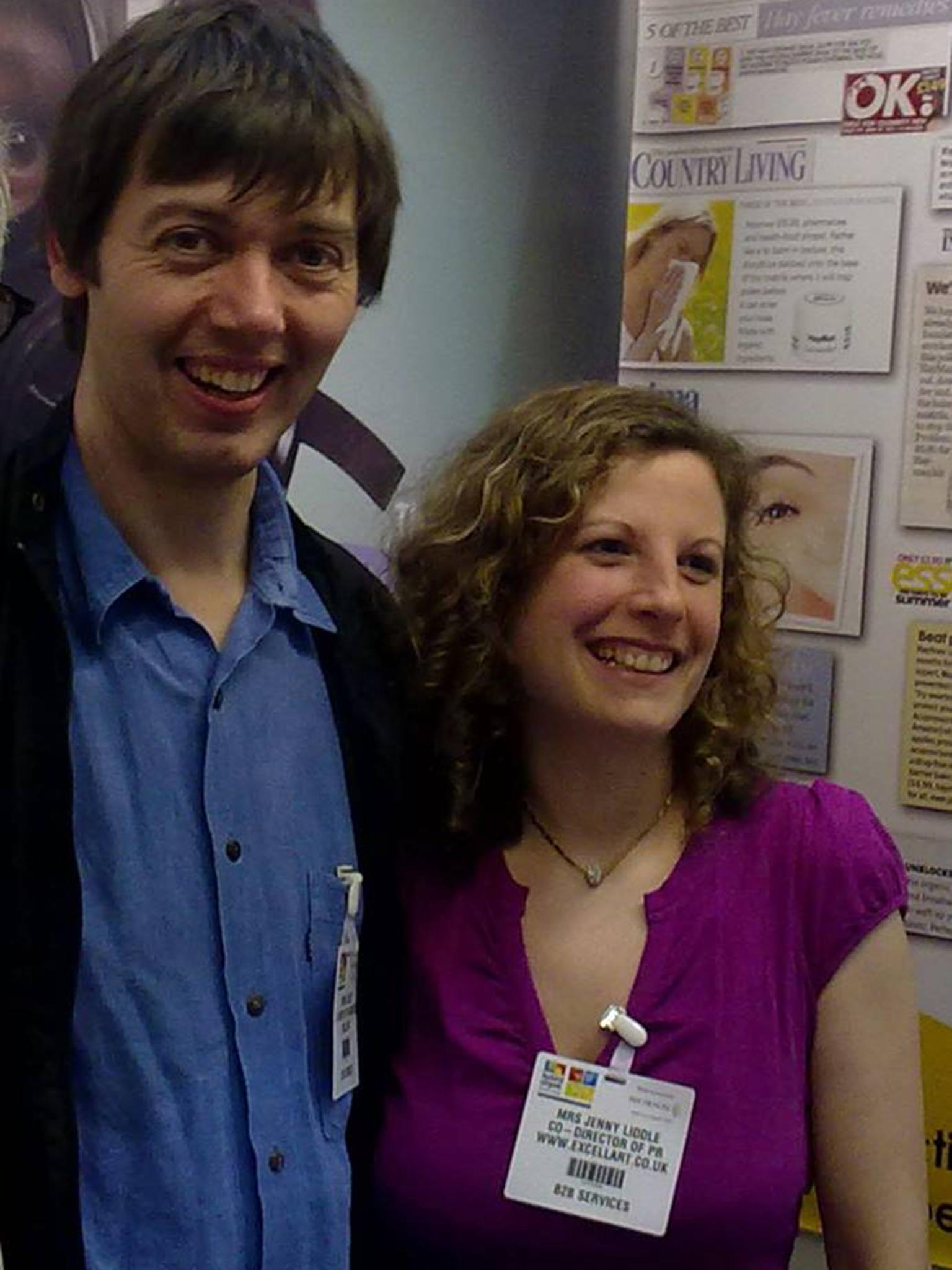The vegan parents who are bringing up meat and dairy-free children
Veganism has shot up in popularity in the past decade. Kashmira Gander speaks to parents who are passing on the plant-based lifestyle to their children

"You’re vegan? How aren’t you dead?” It’s a question that Elizabeth Tighe’s 12-year-old son is asked more often than she’d like. But as a vegan raising her children to follow a plant-based lifestyle, it’s not one that particularly suprises her.
In the past decade, veganism has gone from a niche subculture to a lifestyle advocated by celebrities including Beyonce and Jay-Z. In the decade following 2006, there was a 350 per cent spike in people going vegan in the UK. And Tighe, a 32-year-old artist and mother of four from Herefordshire who runs the vegan website ForkingFit is among them. She, like other devotees, sees this way of living as kinder to both animals and the environment. And scientific evidence backs up their claims that a plant-based diet is inarguably healthier for the average person.
Still, vegans aren’t a particularly liked bunch in some circles. They’re seen as preachy, pushy and self-righteous. Although, vegans might argue that’s just not true, and if meat-eaters feel that way it’s the fault of our guilty consciences. And vegan parents in particular are scorned. Last year, an Italian politician called for a law to be introduced to prosecute vegan parents who impose their “reckless and dangerous eating behaviour” on their children. Parents found to be feeding their children, er, only plants, should be handed a six-year prison sentence, according to Italian politician Elvira Savino.
But some vegan parents admit that they too weren’t huge fans of vegans, until they actually went plast-based themselves and realised vegans aren't really fussed about what other people are eating.

“To be honest I always thought vegans were loud and in your face, trying to shovel their views into you – quicker than a tofu sandwich,” says Tighe. “Yes some are, but on the whole I have met so many peaceful people who have changed to veganism for many different reasons.”
Janet Kearney, a 36-year-old from Ireland who runs the Vegan Pregnancy and Parenting Facebook group and lives in the New York City suburbs with her husband and their children Oliver, four, and Amelia, 19 months, like Savino believed that raising children to be vegan was cruel and wrong. That was until she watched Earthlings, a documentary known as “the veganiser”.
I always thought vegans were loud and in your face, trying to shovel their views into you quicker than a tofu sandwich
“When I was pregnant, a friend stopped eating all animal products,” she tells The Independent. “I thought she was insane, and was probably going to end up in a hospital from such a restrictive diet.
“I would have been the first to question a vegan person’s ability to parent properly, but I think that has a lot to do with the misinformation out there. We don't hear about the thousands of parents who are raising vegan kids, only the ones who abuse their children or starve them. So it's obviously going to get people alarmed when that's the only connection they have to vegan kids.
“Look at it this way,” she goes on. “We as parents want the absolute best for our children, we want them to be happy, and most of all, as healthy as they can be. The vegan parents that I know spend a great deal of time ensuring that their children are eating healthy, the same as parents who feed their children meat and eggs. We find killing animals to be cruel, and wrong. That's why we don't do it.”

“The biggest misconception is that vegan parents are hippies, who want everyone to live on dry toast and walnuts,” says Kearney. “It couldn't be further from the truth. Most vegan parents are shouting at their kids to get off the back of the couch and stop hitting their siblings. They go to work, come home and make dinner.”
But is a vegan diet safe for growing children? Earlier this month, Professor Mary Fewtrell, the chairman of the European Society for Paediatric Gastroenterology, Hepatology and Nutrition warned parents that getting a vegan diet wrong can cause “irreversible cognitive damage and, in the extreme, death”. “Our advice is that if parents pursue a vegan diet for their child, they must seek and strictly follow medical and dietary advice,” she added.
However, dieticians agree that a vegan upbringing can be healthy if, like with any diet, the correct nutrients are eaten.
Compared to adults children require higher levels of nutrients and vitamins, including A, C, and D, and as milk and other dairy products are an important source of calcium, vegan parents should be careful to give their children foods fortified with the mineral. Plant-based sources of riboflavin, found in fish and meat, and iodine, found in dairy and meat, should also be eaten, as well as vitamin B12 supplements.
“A vegan diet needs careful consideration and planning to ensure a wide variety of nutrients and energy are consumed as some essential nutrients are primarily found in animal products,” says Susan Short, a spokesperson for the British Dietetic Association (BDA), tells The Independent.
Clare Thornton-Wood, BDA spokesperson and specialist paediatric dietitian at Healthcare On Demand, adds that breast milk can help parents nourish young children. There are no vegan infant formulas on the market, as Vitamin D is derived from sheep’s wool and soya is not recommended for babies under six months.
Jenny Liddle, a 43-year-old living in Somerset – where she runs a PR agency – has been a vegan for 18 years and has been vegetarian since birth. She ate a plate-based diet when she was pregnant. She says having a person growing inside of her made her think even more carefully about what she puts in her body. To her surprise, she found her calcium levels were higher than the average person when she was pregnant because she ate calcium-fortified plant milks and a wide range of foods.
However, Liddle says she accepts that “we’re never going to be able to achieve a 100 per cent vegan lifestyle. That doesn’t exist yet.” Her children’s health, rather than any ideology, is always her priority.

“If I hadn’t been able to breastfeed I could have secured a vegan source of pumped donor breast milk. And if this hadn’t been possible then I could have used a formula,” Liddle says. “I feel that it’s very important to go ahead with this, even though current formulas contain vitamin D3 from sheep. If you think of formula as a food for a medical purpose, you can appreciate that it’s necessary for the survival of the baby due to breast milk being unavailable.
"Sometimes there’s no practical or possible alternative. But I feel taking vital medicine does not mean I’m no longer vegan or my child is no longer vegan – and The Vegan Society recognise that,” she adds.
Tighe, Liddle, and Kearney all stress that being vegan is something they don’t force on their children, although they do actively educate them about why eating animal products might be bad for their health and the environment.
“My children would never even think of the idea that our pet ducks, chickens or cat being are ‘food’. It would upset them,” says Kearney. “They're their best friends, in much the same way people would never look at their pet dog and think of a Sunday dinner.
“We take a very gentle approach to explaining veganism to our children. I don’t want to them frightened or worse, thinking their friends or family are horrible people because they still eat animals. It's a fine line to walk.”
“I just support my children and their choices,” chimes Tighe. “I make sure they feel comfortable to change their minds about vegansim if they wish. They are all quite passionate about veganism now. I’m not sure what is more poignant than a four year old asking you: ‘Why would you love one animal but kill another?’”
Join our commenting forum
Join thought-provoking conversations, follow other Independent readers and see their replies
Comments
Bookmark popover
Removed from bookmarks